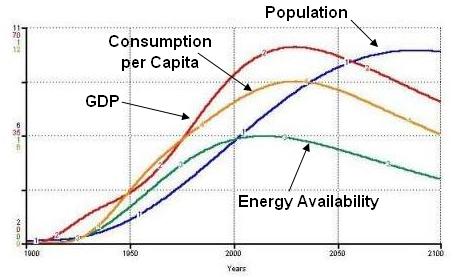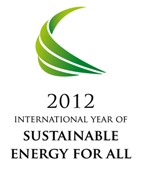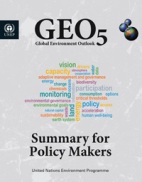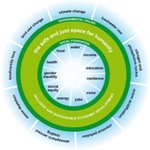|
1. Suggestions for Prayer, Study, and Action
|
EARTH DAY PRAYER
|
"Creator God, we confess that we have sinned against you and against our neighbor, in thought, word, and deed,
both by what we have done and by what we have left undone. We have used more than our fair share of the gifts
of energy you have given us. We have not worked to ensure fair access to energy for all peoples, especially the most
vulnerable among us.
"Creator God, we have not considered the effects of our energy use on our neighbors in our community and around
the world. Have mercy on us, forgive us, and help us to strive for a just energy future, in which all people can
receive the resources they need, and in which our energy use is sustainable and treads lightly on your Creation."
Earth Day Sunday Resources,
Eco-Justice Programs, NCCC, March 2012
|
|
|
One criterion of the grant is to create and make available, via the Internet, an open-source textbook for use in introductory college courses. A self-imposed criterion is to identify an expand ing field of knowledge, common to all three campuses, where the open-source textbook could provide a sound foundation for effective teaching and learning. To that end, the team guiding the project has selected "sustainability" as the general focus of the University's open-source textbook. It should be noted that "sustainability" was also the field of study identified by Illinois community colleges for a potential a partnership with the University of Illinois. This textbook serves a need identified by faculty teaching in the sustainability area, i.e. the lack of a single, comprehensive, introductory text.
"Sustainability: A Comprehensive Foundation" is a free, open-source textbook available for viewing online or as a download for use on e-readers or printing. First and second-year college students are introduced to this expanding new field, comprehensively exploring the essential concepts from every branch of knowldege – including engineering and the applied arts, natural and social sciences, and the humanities. As sustainability is a multi-disciplinary area of study, the text is the product of multiple authors drawn from the diverse faculty of the University of Illinois: each chapter is written by a recognized expert in the field. Designed for the new generation of e-readers, the book can also be viewed in a browser, saved as a pdf, or printed.
| |
|
|
2. News, Publications, Tools, and Conferences
|
NEWS
|
PUBLICATIONS
|
| |
| |
TOOLS & DATABASES
|
| |
|
CONFERENCES & JOURNALS
|
| |
|
|
3. Advances in Sustainable Development
|
"The challenges facing the planet today are unprecedented and extraordinary; climate change, water
scarcity, poverty, disease, growing inequality of income and wealth, demographic shifts, trans-border and
internal migration, urbanisation and a global economy in a state of constant dramatic volatility and flux, to
name but a few. While governments and civil society will need to be part of the solution to these massive
challenges, ultimately it will be companies and investors that will mobilise the capital needed to overcome
them.
"To address these sustainability challenges, we advocate for a paradigm shift to Sustainable Capitalism; a
framework that seeks to maximise long-term economic value creation by reforming markets to address real
needs while considering all costs and stakeholders.
"The objective of this paper is twofold. First, we make the economic case for mainstreaming Sustainable
Capitalism by highlighting the fact that it does not represent a trade-off with profit maximisation but instead
actually fosters superior long-term value creation. Second, we recommend five key actions for immediate
adoption that will accelerate the mainstreaming of Sustainable Capitalism by 2020:
1. Identify and incorporate risks from stranded assets;
2. Mandate integrated reporting;
3. End the default practice of issuing quarterly earnings guidance;
4. Align compensation structures with long-term sustainable performance; and
5. Encourage long-term investing with loyalty-driven securities.
"In addition, we also believe that there are five broader ideas that merit ongoing support and attention.
Specifically, we think there is a need to:
i. Reinforce sustainability as a fiduciary issue;
ii. Create advisory services for sustainable asset management;
iii. Expand the range and depth of sustainable investment products;
iv. Reconsider the appropriate definition for growth beyond GDP; and
v. Integrate sustainability into business education at all levels.
"Ben Franklin famously said, “You may delay, but time will not, and lost time is never found again.” We have
the opportunity to rebuild for the long term and an obligation to seize it. Sustainable Capitalism will create
opportunities and rewards but it will also mean challenging the pernicious orthodoxy of short-termism. Now
is the time to accelerate the transition."
To download the complete paper, click
here
|
4. Advances in Integral Human Development
|
"This Report explores the integral links between environmental sustainability and equity and shows that these
are critical to expanding human freedoms for people today and in generations to come. The point of departure
is that the remarkable progress in human development over recent decades that the Human Development
Report has documented cannot continue without bold global steps to reduce environmental risks and
inequality. We identify pathways for people, communities, countries and the international community to
promote environmental sustainability and equity in mutually reinforcing ways.
"The cover diagram symbolizes how different policies can have different implications for sustainability and
equity. Whenever available, we should prefer solutions that are good for the environment while also promoting
equity and human development. Pursuing sustainability and equity jointly does not require that they be
mutually reinforcing. In many instances they will not be. Sometimes the most feasible alternative involves
trade-offs between sustainability and equity and requires explicit and careful consideration. No trade-off is
isolated from a society’s structural and institutional conditions, and so we must address the underlying
constraints and identify positive synergies between sustainability and equity. This Report is aimed not only at
finding positive synergies but also at identifying ways to build them."
From the Global Human Development Forum in Istanbul:
Urgent action needed to combat social inequalities and environmental risks,
UN Secretary-General tells Global Human Development Forum
UNDP and Turkey's Ministry of Development, 22 March 2012
|
5. Advances in Integrated Sustainable Development
|
Note from the CASSE editor: "The Natural Resources Forum (vol. 35, no. 4) asked 29 experts, including Herman Daly, “What do you think should be the two or three highest priority political outcomes of the United Nations Conference on Sustainable Development (Rio+20), scheduled for Rio de Janeiro in June 2012?” His answer succinctly sums up the steady-state perspective."
Herman Daly - "The conclusion of the 1972 Limits to Growth study by the Club of Rome still stands 40 years later. Even though economies are still growing, and still put growth in first place, it is no longer economic growth, at least in wealthy countries, but has become uneconomic growth. In other words, the environmental and social costs of increased production are growing faster than the benefits, increasing “illth” faster than wealth, thereby making us poorer, not richer. We hide the uneconomic nature of growth from ourselves by faulty national accounting because growth is our panacea, indeed our idol, and we are very afraid of the idea of a steady-state economy. The increasing illth is evident in exploding financial debt, in biodiversity loss, and in destruction of natural services, most notably climate regulation. The major job of the United Nations Conference on Sustainable Development is to help us overcome this denial and shift the path of progress from quantitative growth to qualitative development, from bigger to better. Specifically this will mean working toward a steady-state economy at a sustainable (smaller than present) scale relative to the containing ecosystem that is finite and already overstressed. Since growth now makes us poorer, not richer, poverty reduction will require sharing in the present, not the empty promise of growth in the future."
|
6. Sustainability Games, Databases, and Knowledgebases
7. Sustainable Development Measures and Indicators
2012 Environmental Performance Index (EPI)
Switzerland Ranks at Top of the 2012 EPI
and Latvia Takes #1 Spot in New Trend EPI Rankings
Ysella Yoder, Yale University, 26 January 2012

The
Summary for Policymakers provides a quick look at the EPI framework and methodology,
and summarizes the overall EPI and Pilot Trend EPI rankings, results, and conclusions.
|
8. Sustainable Development Modeling and Simulation
The graph below is a simple simulation of world population, gross production/consumption, and energy availability trends:

As of EOY 2011, World Population = 7 Billion, World GDP = 61 Trillion PPP Dollars,
World Energy Use = 0.5 Zeta Joules (or approx 82 billion barrels of oil), and
Average Consumption per Capita = 9000 Dollars
The simulation tipping points would seem to approximate current trends. If the supply of usable energy from fossil fuels peaks and declines as shown by the green curve, how much energy would have to be generated from other sources to support the current GDP output? Even for the sake of social solidarity and ecological sustainability, would most people in the "developed" nations be able/willing to "survive" with $9000/year?
The past cannot be changed, and the future is unknown, but there is empirical evidence to the effect that:
1. Fossil fuel resources are high in energy content but are not infinite.
2. Fossil fuel emissions are environmentally detrimental and/or potentially unsafe.
3. Currently known clean energy alternatives offer relatively low energy content.
Given that fossil fuels are being depleted, pollution levels are damaging the environment, and clean energy alternatives may not provide enough energy to sustain industrial economies, is it wise to just continue doing "business as usual" and trusting that some earthshaking technological breakthrough will come to pass soon enough? Is it fair for people in the "developed" nations to keep indulging in energy consumption and waste while approx. one billion people must subsist on $2 per day or less?
|
9. Fostering Sustainability in the International Community
|
UNITED NATIONS
Sustainable Energy for All
INITIATIVE
Three broad objectives to be achieved by 2030:
Ensuring universal access to modern energy services
Doubling the rate of improvement in energy efficiency
Doubling the share of renewable energy in the global energy mix
|

Sustainable Energy for All
|
|
UNITED NATIONS
Global Environmental Outlook (GEO-5)
Summary for Policy Makers
UNEP, 20 February 2012
Three highest priorities:
Aligning governance to the challenges of global sustainability
Transforming human capabilities for the 21st century
Ensuring food safety and food security for 9 billion people
|

Global Environmental Outlook (GEO-5)
|
OXFAM INTERNATIONAL
'The Doughnut'
of Social and Planetary Boundaries for Development
"A Safe and Just Space for Humanity: can we live within the doughnut?"
Kate Raworth, Senior Researcher, Oxfam UK, 13 February 2012
|
In the run-up to Rio+20 United Nations Conference on Sustainable Development, this discussion paper is an exploration of what such a model of prosperity might look like. It presents a visual framework -- shaped like a doughnut -- which brings the concept of planetary boundaries together with the complementary concept of social boundaries, creating a safe and just space between the two, in which humanity can thrive.
Source: Oxfam UK
Download the paper here
Watch the video here
Join the discussion with Kate Raworth here
Original article on the nine planetary boundaries
|

VIEW LARGE IMAGE
|
|
|
"At the 1992 United Nations Conference on Environment and Development, popularly known as the Rio Earth Summit, the world’s leaders constructed a new "sustainable development" paradigm that promised to enhance environmentally sound economic and social development. Twenty years later, the proliferation of multilateral environmental agreements points to an unprecedented achievement, but is worth examining for its accomplishments and shortcomings.
"This book provides a review of twenty years of multilateral environmental negotiations (1992-2012). The authors have participated in most of these negotiating processes and use their first-hand knowledge as writers for the International Institute for Sustainable Development’s Earth Negotiations Bulletin as they illustrate the changes that have taken place over the past twenty years. The chapters examine the proliferation of meetings, the changes in the actors and their roles (governments, nongovernmental organizations, secretariats), the interlinkages of issues, the impact of scientific advice, and the challenges of implementation across negotiating processes, including the Framework Convention on Climate Change, the Convention to Combat Desertification, the Convention on Biological Diversity, the Commission on Sustainable Development, the UN Forum on Forests, the chemicals conventions (Stockholm, Basel and Rotterdam), the Montreal Protocol on Substances that Deplete the Ozone Layer, the Convention on International Trade in Endangered Species, the Convention on Migratory Species and the International Treaty on Plant Genetic Resources for Food and Agriculture."
|
|
|
Millennium Alliance for Humanity and the Biosphere
Getting to a Sustainable 2050?
A presentation by Robert E. Horn World Business Council for sustainable Development
Vision 2050 addressed thought-provoking questions like:
- What would a vision of a sustainable future look like?
- What are the pathways and solutions for achieving sustainability?
- What does this say for the changes needed?
- What are the risks to achieving this “sustainable” future?
- What are the dilemmas we must address to move forward?
- What are the robust actions, policies and investments needed to move rapidly onto a sustainable pathway?
- What is the role of "business"?
| |
RECENT ARTICLES & REPORTS IN ANTICIPATION OF
RIO+20
State of the Planet Declaration, Planet under Pressure Conference, Earth System Science Partnership, London, 29 March 2012
Raising gender on the global development agenda, UN Women, 28 March 2012
First Round of ‘Informal-Informal’ Negotiations on the Zero Draft of the Outcome Document and Third Intersessional Meeting of the UN Conference on Sustainable Development (UNCSD or Rio+20), UN Headquarters, New York, 27 March 2012
Global Human Development Forum adopts ‘Istanbul Declaration’ urging bold action at UN ‘Rio+20’ conference this June, Global Human Development Forum, Istanbul, 23 March 2012
Global Transition Dialogue on the New Economy: How to make it green and fair?, New Economics Institute, 22 March 2012
Female negotiators at Rio+20 must forge common front to give a voice to forest-dependent women, Catriona Moss, Forests, 20 March 2012.
People’s Summit at Rio+20: what it is and what it is not,
Belgian Social Forum, 15 March 2012
Why Does Social Media Matter for Rio+20?, UNCSD, 12 March 2012
Our Voice for Rio +20, Australian Earth Charter, 11 March 2012
Rio +20: A Date With History (in the Making), Kelly Rigg, Huffington Post, 6 March 2012.
Why Rio+20 must not leave the politics out of sustainable development, Melissa Leach, The Guardian, 5 March 2012
Innovation for Sustainable Development, Rio+20 Issues Cluster on Innovation, March 2012
Technology Transfer and Innovation: Key Country Priorities for Rio+20, ICTSD, March 2012
What are Sustainable Development Goals?, IGES, Japan, March 2012
The Roads from Rio: Lessons Learned from Twenty Years of Multilateral Environmental Negotiations, Pamela S. Chasek and Lynn M. Wagner (Editors), Routledge, 29 February 2012
MPs fear global economic crisis will hamper Rio+20 progress, David Thorpe, Energy & Environmental Management, 29 February 2012
UNEP Clarifies Position as Rio+20 Draws Nearer, ICTSD, 24 February 2012
Preparation for the People's Summit at Rio+20, Women on the Road to Rio20, 22 February 2012
Rethinking Growth and Sustainable Development, PolicyShop, 22 February 2012
Road To Rio+20: Ambitious Goals For Sustainable Development? – Analysis, Ong Suan Ee, RSIS, 20 February 2012
Ban calls for global economic model that promotes greater social justice, Secretary-General Ban Ki-moon, United Nations, 20 February 2012
Special issue on institutions for sustainable development, David Le Blanc, Natural Resources Forum, 20 February 2012
Business leaders on sustainable growth and Rio+20, Alana Chloe Esposito, MediaGlobal News, 16 February 2012
Can we live inside the doughnut? Why the world needs planetary and social boundaries, Kate Raworth, Oxfam, 13 February 2012
A safe and just space for humanity, Kate Raworth, Oxfam, 13 February 2012
The Public Trust Doctrine and Rio+20,
Mary Turnipseed et al., NCEAS, UCSB, February 2012
Bold action is needed to make sustainable development a reality, The Elders, 30 January 2012
Initial Discussions on the “Zero Draft” of the Outcome Document for the UN Conference on Sustainable Development (Rio+20), IISD, 30 January 2012
Ambitious UN Sustainability Conference in Rio to Avoid Climate Talk, Alex Newman, New American, 28 January 2012
Five-Year Action Agenda: "The Future We Want",
Secretary-General Ban Ki-moon, UN, 25 January 2012
Global Compact Launches Web Platform to Mobilize Business for Rio+20, UN Global Compact, 23 January 2012
Rio+20: Analysis of Zero Draft Submissions, CloudStakeholder Forum, 22 January 2012
Does green growth make economic sense? Yes, but you have to do it right,
Bert Metz, European Climate Foundation, 16 January 2012
Towards Rio+20, World Democratic Governace Project Association, January 2012
Rio+20 Draft Outcome Document Released,
Bridges Weekly Trade News Digest, 11 January 2012
Leaked document reveals Rio+20 sustainable development goals,
John Vidal, The Guardian, 10 January 2012
The Place of Environmental Education at Rio+20,
Christina Cotter, Human Impacts Institute, 10 January 2012
The Future We Want,
UN CSD, Zero Draft for Rio+20, 10 January 2012
Green Economy: ‘Everyone’s talking about it’ - An analysis of the UNCSD Zero Draft text submissions,
Green Economy Coalition (GEC), January 2012
Road to Rio+20 – Fresh Opportunity to Scale-Up Sustainable Development?, AfricanBrains, 5 January 2012
Rio+20: Preliminary information for participants, ZUNIA, 5 January 2012
Spiritual Dimensions of Sustainable Development, Soetendorp Institute, January 2012
Interreligious Statement Towards Rio+20, Soetendorp Institute, January 2012
Premises for a New Economy, An Agenda for Rio+20, Great Transition Initiative, January 2012
|
|
|